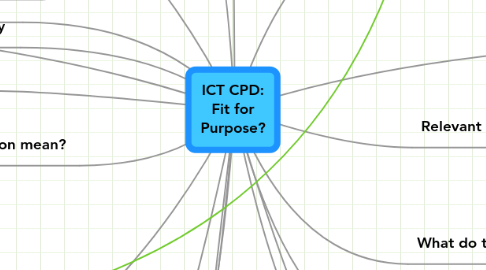ICT CPD: Fit for Purpose?
da John Cuthell


1. What you see is what you get
2. Assistive technology
2.1. Teaching & learning at core
3. Teaching of ICT will not survive much longer
3.1. Are Functional Skills enough?
3.2. Build Technological, Pedagogical, and Content Knowledge (TPCK), not just the T!
4. Learning platforms?
4.1. too boring and unassociated with needs
4.2. How do you make these authentic
4.3. Other models than just a repository
4.4. Where well led & relevant to all learners makes whole school buzz!
4.5. need to utilise social network style input
4.6. We learn better together, helps reflection
4.7. We need to come up with a Statement of Requirements which is platform agnostic!!!
4.8. Colaboration should be national not limited to individual schools!
5. Games?
5.1. Gamers use 'community' for personal learning.
5.2. Most ICT Developments are in Games play. We need to harness the best to ensure we are inclusive ie Boys!
6. Accreditation?
6.1. skills
6.2. T&L Pedagogy
6.3. GTC accreditation
6.4. again authentic - action research models
6.5. As an incentive—tied to reward structure and personal motivation (for formal recognition)
7. What are the barriers?
7.1. Diversity of people's existing ICT skills
7.2. Lack of recognition of how ICT can help
7.3. "What I've always done before works really well. Why should I change?"
7.4. Fear of admitting a need.
7.5. The kit is unreliable
7.6. Leadership not fully 'signed up'.
7.7. Time and opportunity for CPD cascading
7.8. Lack of opportunity to monitor impact and plan strategically as a result
7.9. Short-term vs. long-term
7.10. Institutional Arrogance
7.11. Over cautious filtering/restrictive technical teams
7.12. We are a barrier as our lang/jargon excludes rather than includes!
7.13. fear of thinking others are better able to use the technology
7.14. "I've got enough on as it is, thank you!"
8. What does innovation mean?
8.1. Changing the school day or terms?
8.2. Changing how we "do" school?
8.3. Re-think the purposes of education away from information transmission
9. purpose of ICT CPD?
9.1. Must be relevant
9.2. work-based research
9.3. timely
9.4. develop a community problem solving ethos?
9.4.1. Supportive, not competitive
9.5. Remove feeling of exposure
9.6. Develop higher thinking skills (Bloom's)
9.6.1. Avoid the skills - so what? question
9.7. Create excitement about learning, rather than fear
10. Must be timely
10.1. Generic or 'course'-based CPD is not the best model
10.1.1. Improved if leader is practitioner & allows course to be led by "delegates"
10.2. Action research pull model
10.3. If the CPD doesn't hit you at the right point in your development, the impact is lost
10.4. Relevant to learner needs
11. New Teachers and CPD
11.1. Do we encourage reflection in the right ways?
11.2. How is this continued after QTS?
11.3. How embedded is reflective practice after University course?
11.4. Online environments for support and community building—plus daily problem-solving and timely advice!
12. What can help ICT CPD
12.1. E-Learning
12.2. ICT CPD Key role mentorship within schools with time to team teach and facilitate
12.3. Teachmeets
12.4. Leadership Focus
12.5. Open school cultures
12.6. Kit getting easier and more reliable
12.7. ICT embedded as good teaching & learning catalyst
12.8. Higher profile on national/local agendas
12.9. MirandaMods
12.10. Drivers to help with intrinsic motivation
13. Management role in CPD effectiveness?
13.1. Must be enlightened in order to empower
13.2. Willing to take risk
13.3. Does accountability get in the way?
13.4. Must be an ICT management person on the SMT
14. How continuous is CPD?
14.1. Is there a point where you can know it all?
14.2. Can we link it with behavioural factors?
14.2.1. Maslow
14.2.2. Locus of control
14.2.3. Motivation
14.2.4. Self-image
14.3. Catalysts for personal CPD Change
14.3.1. other people
14.3.1.1. Young people and what they do/are capable of
14.3.2. Events
14.3.3. projects: BPRS,Mirandanet etc
14.3.4. Money/efficiency
14.3.5. Theories of how people learn
14.3.6. Changes in curriculum and/or exam board specs
